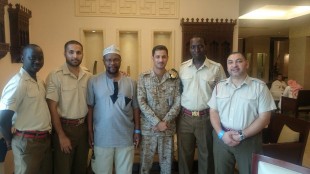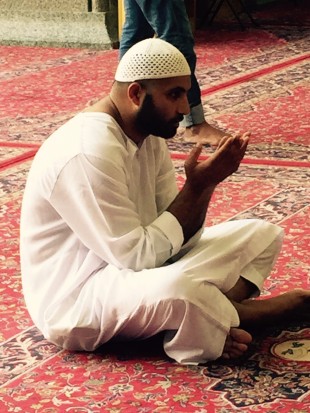Last week, five UK Armed Forces personnel travelled to Mecca to perform Hajj. Major Mohammed was one of those personnel and shares his experiences of Hajj, returning to work and life in the Armed Forces.

There were five of us that went from the UK Armed Forces. One person had been in the Army for 5 years and another for 26 years and the Armed forces Imam is a Civil Servant, so it was a real mix of ranks and career experiences and the group was better for it. When you’re wearing your whie towels during Hajj, the whole point is that you’re equal in the eyes of God so we wanted to deliver on that when choosing people to go. The equality between everyone performing Hajj made you feel really united with other Muslims. I remember praying with a Syrian to my left and a Sub-Saharan African guy to my right and Turks behind me.
It was brilliant to worship and meet with all nationalities. We got the opportunity to meet Muslims from other country’s Armed Forces. Some were very surprised that there were even Muslims in the British Armed Forces! Talking to other nationalities, it was interesting to learn how they carry out the Eid sacrifice. In Saudi Arabia, it’s all done online, You get a voucher for slaughtering a lamb on Eid dy and then the meat is distributed to the poor.
At the end of Hajj there’s an optional component to go to Medina in Saudia Arabia where you go to the Prophet’s Mosque. This is where Mohammed and his companions were buried. This is one of the most beautiful mosques in Islamic architecture. We got to pray in there a couple of times and were even able to get an area closed off for us so that we could pray right next to the prophet’s mausoleum. We all found this really emotional and for me, it was a highlight of the trip.
To say I’m delighted to have gone on this trip would be an understatement. I’ve come back energised and balanced in terms of spiritual awareness and beliefs, and enthused about my work. The other members of my group feel the same.
Now I’m back at work and the response from other people has been great. Everyone had been concerned about my safety during the sadness of the stampede incident and about my wellbeing because of the rigours of Hajj, such as the long days, the heat, the walking. Everyone was really interested in what it was all about. It was really brilliant to be able to talk to non-Muslims in the Armed Forces about Hajj and my experiences, and to inform them about something they might not have known anything about before.
Going to Mecca to perform Hajj meant a lot to me, it’s the fifth pillar of Islam and to achieve that is very special. Some Muslimsworry that they’ll never be able to perform Hajj whilst working for the UK Armed Forces, as they imagine they won’t be allowed to take the time off work. But this trip demonstrates that this simply isn’t the case - the Armed Forces helps you perform Hajj. Some of the younger Muslims also worry that they’ll lose their link with their religion when they join the Armed Forces. I am pleased to see how far the military has come in supporting them so this doesn’t happen. But they don’t just do this for Muslims. The Armed Forces makes sure the servicemen and women, who keep our nation safe, have the time and support they need to practice their faith, whatever that faith is. Hajj was an unforgettable experience for all of us, and I thank the Armed Forces for supporting us in making this journey. I hope we can take more people with us next year.
Major Mohammed joined the Army as a 17 year-old medical apprentice before serving 11 years as a combat medical technician in Northern Ireland, Bosnia, Kosovo, Rwanda and Germany. Later, he did his officer training at Royal Military Academy Sandhurst and then served in Iraq and Afghanistan. On returning from operations, Major Mohammed became a lecturer and research fellow at Kings College London where he advised on mental health issues within Defence.

